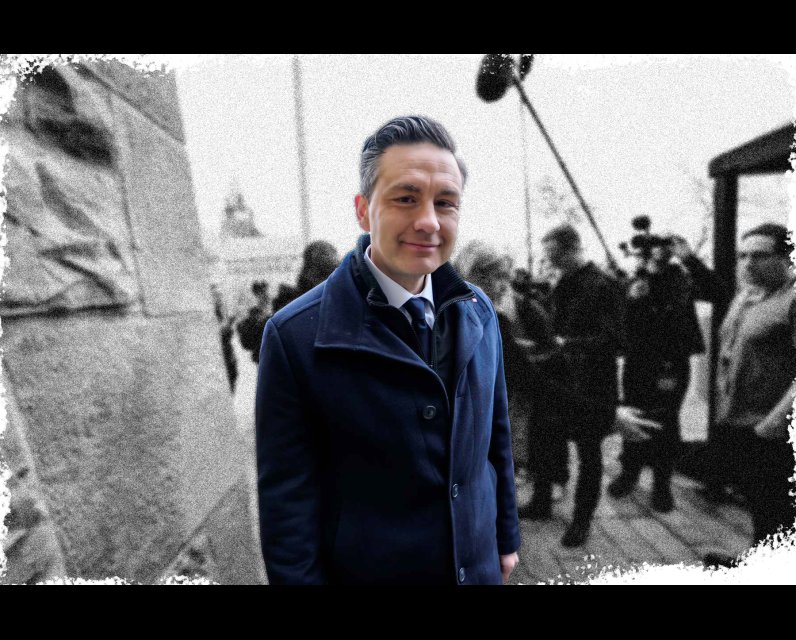Source Feed: Walrus
Author: Mark Bourrie
Publication Date: June 10, 2025 - 11:12
Pierre Poilievre Is Not Backing Down
June 10, 2025

The country sits on the edge of its seat, obsessed with the question: Wither Pierre Poilievre?
Except, of course, it isn’t. I ruined most of 2024 by writing a book about him, and my own interest is, to be kind, in stasis. One week, the book was second on the list of bestselling Canadian non-fiction titles. Several weeks later, it wasn’t a bestseller at all.
Makes sense to me. I wouldn’t have bought it either, though there’s a lot in Ripper: The Making of Pierre Poilievre that warns of institutional and media decline that threatens Canada’s shaky democracy. Much of the book is really about why politics attracts the broken and the sociopathic and is too toxic for people with anything going for them.
But if you were partway through the book on election day, don’t recycle it. Though Poilievre may have come up short at the polls on April 28 and lost his own seat, we haven’t seen the last of him. The Conservative Party leader is ferocious, determined, and smart, and he’s doing as much as he can to make it difficult, if not impossible, to get rid of him.
You’d have to be a keen Tory or hard-core political junkie to know that Poilievre and his team are looking to reschedule an important Conservative convention from spring 2026 to this fall. That means it will be held around the time Poilievre will be running for a new seat in Battle River-Crowfoot, Alberta, to get back into the House of Commons. His caucus may have adopted the Reform Act, a law that allows MPs to vote out their party leader—which Poilievre used to oust Erin O’Toole in 2022—but it will be hard to dump someone with a renewed mandate from membership.
And while Poilievre is, at least temporarily, being nicer to the media at a time when it doesn’t matter much, he’s not showing contrition behind closed doors. He won’t let go of Jenni Byrne, who has been his political partner since the 2000s, despite reports of complaints about her supposed arrogance and ineptitude, made by Tory MPs during an eight-hour caucus meeting. And these were from the MPs who won.
But Poilievre has strong arguments of his own. The Conservatives won more votes than they ever have. (Some pundits say it was the best showing for Tories since 1988, but the modern Conservatives aren’t Brian Mulroney’s Progressive Conservatives, so the comparison is dubious.)
Despite Donald Trump’s tariffs and threats of more, the Conservatives won the ridings that are home to the Oshawa, Alliston, Ingersoll, Woodstock, and Windsor car assembly plants. The Tories snuffed out the last two New Democratic Party seats in southwestern Ontario and finished their project of taking the old Liberal ridings of Herb Gray, Paul Martin Sr., Eugene Whelan, Shaughnessy Cohen, and many less-famous Liberals.
The Conservatives also built support in the multicultural satellite cities of Toronto, proving the Tories’ point that new Canadians don’t like paying taxes any more than other people and are just as worried about crime. They picked up NDP seats across the country, affirming their role as Canada’s dominant party of protest.
The Liberals had every possible break. The existential threat of Trump. The replacement of an unpopular prime minster with someone who was not yet known (or hated)—and who swiftly scrapped the controversial consumer carbon tax. A Conservative leader disliked by women, with a campaign team that made more enemies than friends. They could point to an over-the-top conservative Alberta premier threatening separatism. A split between eastern and western Tories, with Ontario premier Doug Ford and Nova Scotia premier Tim Houston staying on the sidelines—and instructing their teams to do the same. The collapse of the NDP, with a chunk of the vote going to them, and a similar drop in Bloc Québécois support.
Yet the Liberals couldn’t win a majority. If they couldn’t do it in 2025, when can they?
As for Poilievre, losing his Ottawa seat is likely an inconvenience that he’ll soon rectify. The media and Liberals make a big deal about the loss, but it happens. William Lyon Mackenzie King lost his seat before he was re-elected prime minister in 1926 and 1945. Still, Poilievre and his party should take a long look at why the people of Carleton voted him out.
Bruce Fanjoy. Look at the name. Fan. Joy. A big, happy man running for the Liberals—a hard-working no-hoper showed up on doorsteps in the suburban Ottawa riding represented by Poilievre, pitching himself and a positive message.
For many months, Fanjoy was on his own. Political parties don’t spend money and send strategists to ridings they don’t think are winnable. After Fanjoy blew through two pairs of shoes, the national Liberal team noticed his campaign and started sending reinforcements. His team bought a billboard near a popular flea market, featuring an unflattering picture of Poilievre and a harsh line about Canadians—“It’s not the Americans’ fault. It’s our fault. We’re stupid”—that Poilievre said on a Jordan Peterson podcast.
Poilievre had won Carleton in 2004—or the main part of it, as the riding’s boundaries changed in ways that favoured him—with the same kind of shoe-leather campaigning Fanjoy did. Until 2019, constituents saw quite a bit of him. He had a scare in 2015, when Harper lost power and some of the larger public sector unions campaigned against him, but he fended off the threat. After he won the Tory leadership, he was AWOL. He lived at Stornoway, not in his house in the riding. He held rallies all over Canada but rarely met anyone in Carleton. People griped on social media.
But will Poilievre change the way he campaigns? And will he change himself?
Poilievre seems to lack self-awareness and reflection. Loyalty, a virtue in others, becomes a liability when a politician clings to those who aren’t up to the job. Or who alienate potential friends. Since he was a kid, Poilievre’s rigidity has walled out new ideas and contrary, sometimes better, ways of looking at things.
Byrne, his ex–romantic partner who still manages his campaigns, was already under a cloud for being blamed, perhaps unfairly, for Stephen Harper’s 2015 loss (though anyone who thinks the big decisions were made by Byrne simply doesn’t understand how Harper works). She recovered some of her reputation when she worked on Ontario premier Doug Ford’s winning campaign in 2018, but insiders have suggested she was fired (something Ford’s brain trust didn’t say at the time).
But someone needs to take the blame for some serious unforced errors, like the lack of a real platform. The party was also slow to vet and nominate local candidates, despite Poilievre’s attempts to force an early election. This meant some riding campaigns were late getting started. Candidates said they were told not to show up for all-candidates meetings—one of the few opportunities for voters and local media to size them up. Then there was the demonizing and bullying of Canada’s rump, docile mainstream media for no good reason and with no good results for the Conservatives.
I called Poilievre a “ripper” in my book because he’s good at identifying and amplifying real problems and hollering about things like trans rights that aren’t a problem at all. Right now, most people don’t want to hear that stuff. They have handed the government over to Mark Carney, a textbook technocrat. Eventually, Canadians will turn on him: Lester B. Pearson was the last prime minister to leave with something resembling the thanks of a grateful nation. The rest—Pierre Trudeau, Brian Mulroney, Jean Chrétien, Justin Trudeau—were knifed by factions in their own party or—like John Turner, Kim Campbell, Paul Martin, and Stephen Harper—were turfed by voters. Carney is already developing a reputation as a rigid, demanding micromanager.
So far, the Tories have been led by a skilled opposition leader, but their challenge is his plausibility as prime minister. People didn’t buy the angry young man offered to them in 2025. Can Poilievre mature? Can he do the self-evaluation needed to understand why so many people were turned off by his personality? Can he level with people instead of torquing real and imagined national and regional problems? Can he just tone it down?
Not to sound like a Leafs fan, but the next election is there for the taking. The Liberals will be trying to win their fifth election in a row. This has happened just twice in federal Canadian political history. Mackenzie King and Louis St-Laurent did it between 1935 and 1953, and Pearson and Trudeau had a winning streak from 1963 to 1974. And these people aren’t the mid-twentieth-century Liberal machine.
In 2025, Carney was able to wrap himself in the flag better than Poilievre did, especially when people remembered how Poilievre’s convoy buddies flew the flag upside down or with anti-government, pro-US messages on it. Perhaps Poilievre couldn’t pivot and detach himself from Trump when there was a picture circulating of Byrne in a MAGA hat. Maybe he won because Trudeau was gone. Maybe former NDP leader Jagmeet Singh was so politically toxic that he handed enough votes to the Liberals to save them.
But if this minority lasts as long as the previous one, Carney will face voters when Americans are picking a new president. By then, whatever Trump has planned for Canada will be done. If Poilievre is still on the scene, he will be navigating whatever the post-Trump political landscape looks like. There will almost certainly be a recession, and the things Poilievre makes slogans about—housing prices, youth opportunities, immigration, drug addiction, crime—likely won’t be solved. The NDP will also have a new leader, who should be able to pull some votes back from the Liberals.
That leaves a lot of opportunity for a ripper, if people believe he’s ready to govern. The post Pierre Poilievre Is Not Backing Down first appeared on The Walrus.
Bob Dyce has enough life experience to know that what he has one day may be gone the next. Read More
July 3, 2025 - 19:56 | Don Brennan | Ottawa Citizen
Two suspects have been arrested in British Columbia in an investigation into widespread extortion of South Asian business figures, crimes that police and politicians say reach back to India. RCMP in Surrey, B.C., say the suspects were arrested Thursday on arson and firearms allegations dating from late 2023 into 2024.
July 3, 2025 - 19:34 | | The Globe and Mail
A day after losing her husband, the widow of the man who drowned near Westboro Beach praised those who saved her son's life. Read More
July 3, 2025 - 19:11 | Matteo Cimellaro | Ottawa Citizen



Comments
Be the first to comment